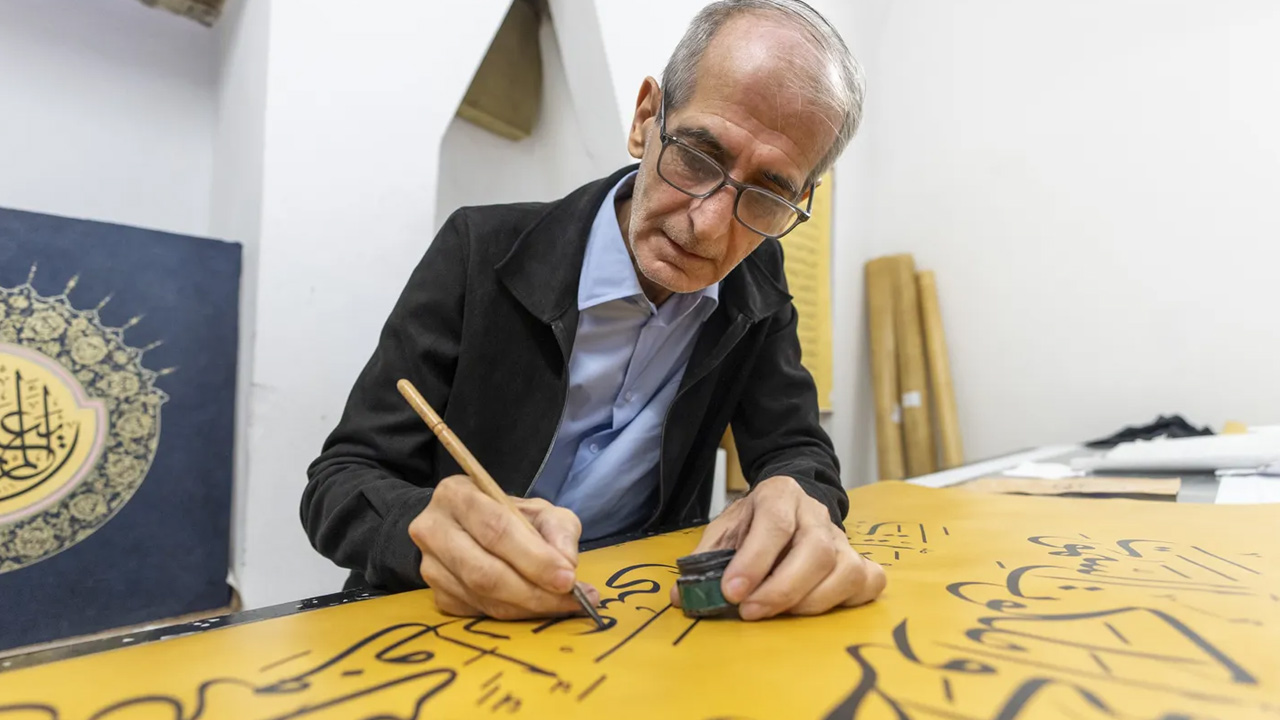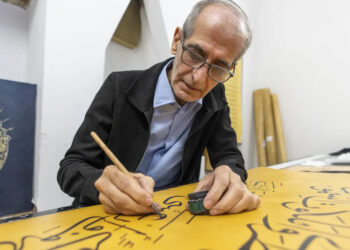Highlights
- Iraqi calligrapher Ali Zaman moved to Istanbul, Turkey, to pursue his passion for calligraphy.
- Took six years to handwrite the world’s largest Quran — each page is 4 meters long and 1.5 meters wide.
- The Quran is written entirely by hand using the Thuluth script, with no modern tools.
- Zaman overcame serious health issues but still completed the project on his own.
- His work has received international awards and recognition across several countries.
A Journey from Iraq to Turkey for Art
Driven by a lifelong passion for Islamic calligraphy, Ali Zaman left his home country, Iraq, and settled in Istanbul, Turkey. There, after six years of dedication, he successfully created the world’s largest handwritten Quran — a masterpiece in Islamic art.
Each page of the Quran measures 4 meters in length and 1.5 meters in width, setting a new record in the world of Islamic calligraphy.
Early Life and Passion for Calligraphy
Born in 1971 in the Ranya district of Sulaymaniyah, Iraq, Ali Zaman showed a strong interest in calligraphy from childhood. In 2013, he gave up his job as a jewelry craftsman to dedicate himself fully to calligraphy.
To focus on his art, he moved to Fatih, Istanbul, in 2017 with his family. By then, he had already completed a 30-page Quran project, with each page measuring 2.10 meters by 1.50 meters.
The Ambitious Quran Project
Encouraged by his success, Zaman decided to take on an even bigger challenge — writing the world’s largest Quran. After one year of research, measurements, and material collection, he presented his design to his mentor, Bizar Erbili, in 2020 and received approval to begin the monumental project.
The Quran was written entirely by hand using the Thuluth script, without any modern devices or machines. When opened, each page spreads to 3 meters in width.
Six Years of Tireless Work
For six years, Ali Zaman worked with deep devotion. Every morning, he began writing after Fajr prayer and continued throughout the day, taking breaks only for food and prayer. He wrote each letter and verse with utmost care, line by line.
“নিজের ব্যবসার জন্য এখন নিজের ওয়েবসাইট — মাত্র কয়েক মিনিটে Storola দিয়ে!”
However, by the end of 2019, his health started to decline. In October 2023, he temporarily paused his work due to illness — his body weight dropped from 83 kg to 58 kg. Despite these challenges, he completed the Quran without any external assistance.
International Recognition and Awards
Zaman’s dedication to calligraphy has earned him global recognition. He has won first prizes in Syria, Malaysia, Iraq, and Turkey for his Thuluth and Naskh scripts.
In 2020, he received official Ijazah (authorization) from several renowned masters of calligraphy. He was also awarded the Prestige Prize by President Recep Tayyip Erdoğan at Turkey’s International Hilaye-i-Sharif Competition in 2017.
A Family’s Support and a Dream Fulfilled
His son Rekar Zaman shared that the family moved to Turkey in 2017 because of the high respect and value given to calligraphy in the country.
“My father dreamed of writing the world’s largest Quran, but Iraq didn’t offer the opportunity or recognition. In Turkey, he fulfilled that dream.”
Read More: “BNP Will Bring Smiles to Frustrated Youth,” Says Emran Saleh Prince
The project officially began in 2019. According to the family, the previous record-holding handwritten Quran measured 2.28 meters long and 1.55 meters wide, while Zaman’s version extends 4 meters in length and 1.5 meters in width, opening up to 3 meters.
Visitors who see the manuscript are often left speechless. Rekar said that even a madrasa teacher, moved by the sight, exclaimed “Mashallah”, and students congratulated Zaman with admiration.
Preserving a Cultural Masterpiece
The family plans to protect the Quran from fire or damage and make it available for display and educational purposes. They have not yet decided whether it will remain in Turkey permanently or be moved elsewhere.
Zaman expressed his deep respect for Turkish art and culture:
“The Quran is sacred, and calligraphy was highly valued during the Ottoman era. Calligraphy holds a special place in Turkey. I hope this Quran remains here and enriches the country’s cultural heritage.”
Source: Dhaka Post


















